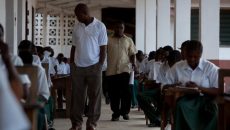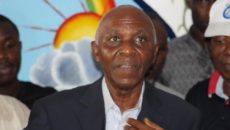As a nation, our educational system is typical of the literacy gap across the world. UNICEF’s report of Liberia recording the highest proportion of children missing out on primary school education indicates that now is the time for us to honestly read our past and write the future.
Statistics showing the continuing failure of secondary students on the WAECÂ exams further prove that we are failing to build the foundation for a more sustainable future for all.
This year’s International Literacy theme: “Reading the Past, Writing the Future†provides leverage to solving the task at hand. The need to read the past while writing the future brings to mind the lessons taught by the mystical Sankofa bird.
The Sankofa bird flies forward while looking backward. The word ‘Sankofa,’ which is associated with the Akan tribe in Ghana, is translated: “it is not taboo to fetch what is at risk of being left behind.â€
The Sankofa symbolizes the Akan people’s quest for knowledge based on critical examination and intelligent and patient investigation into the past.
As a country, we have the framework from which this critical assessment can begin. We are a signatory to nearly all of the internationally acceptable treaties and protocols outlining the need to increase literacy outcomes for all.
On a local level, policies such as the free and compulsory basic education are well-written and align with consistent best practices in countries with high literacy outcomes.
Yet, the deliverables and outputs of these policies and frameworks over the last 12 years sum up the collective state of our educational system.
Like the Sankofa bird, now is the time to look back at these policies and their implementation with honesty and fetch the missing piece(s). This is only possible if we are prepared to critically examine our gains from the past on the foundations of empiricism and analytical research, not assumptions.
Over the years, we have proven adept at recognizing the problems but failed considerably in proffering real and context-driven solutions for solving them.
What if we focused more on context-driven solutions with the same level of energy as identifying the problems? What if we use pure and empirical science to test out the validity of these solutions?
This is not about educational policies; it is about measuring impact and assessing the practical nature of their implementation.
Over the last four years, a total of 99,578 students have taken WAEC’s Liberia High School Certificate Examinations. Of this number, only 48 percent have passed the exam.
A whopping 52 percent of students have failed or had their results withheld due to collusion and other forms of exam malpractice.
The data might be bleak; yet, we can still learn from it.
An honest journey into past exams should provide us with empirical evidence to design action-oriented approach to curbing this problem.
We must ask ourselves: From where are the questions for the exam derived?
This is important because if the basis of the content knowledge is the WAEC syllabus, then we will need to peer even deeper.
Does the WAEC syllabus align with the Ministry of Education’s curriculum? It makes sense to think that the WAEC syllabus and the ministry’s curriculum should align and synchronize with each other.
An honest review proves that this has not been the case for the years in review. The question is: Can we now use this wisdom from the past to write the future?
The ministry and WAEC should work to align both tools for measuring content knowledge. Aligning both syllabi will allow us to understand what scope exists for change within our current system.
In addition to these summative data, are there data indicating the number of failures in each subject?
The subjects on the exam are grouped into categories: compulsory (math and English), science (biology, physics, and chemistry), and general (geography, literature in English, history, and economics). Are there data indicating the total number of failures annually in these different categories?
Now is the time for us to start a data-driven analysis of wherein lie the problems with the content knowledge of the exam.
Peering deeply into our bleak past will require people quite familiar with the terrain, context, people, and community. This speaks volume about the need to integrate local civil society organizations with proven expertise in using data-driven approaches.
Our definition of stakeholders and partners for this journey into the past should not be limited to those who can provide funding and mobilize our donor base.
It must include people who understand the everyday challenges of our schools and students. The latter represents the value proposition for working to build on products developed by local civil society organizations in an attempt to write future.
Since 2011, the Liberia Institute for the Promotion of Academic Excellence has worked to increase student achievement gains. Commonly known as LIPACE, the organization is empowering teachers to see their tireless efforts lead to increased performance gains.
In 2011, LIPACE began turning the tide with a project to isolate the casual factors behind poor student performance on the WAEC exams.
This is a visible proof of the drive and will to read the past and write the future. The outcome of the data-driven research was the design of a comprehensive preparatory program using a truncated curriculum that included key topics that were regularly tested on the exam.
LIPACE’s pilot produced a 75 percent passing rate for students across three counties, compared to national passing average of 59 percent.
At both the C.H Dewey High School in Bomi and the Bopolu Central High in Gbarpolu, students achieved a combined 89 percent passing rate.
As impressive as the result might seem, LIPACE’s scale, like many local organizations, was far too low.
The drive to scale the initiative as a viable level for improving student performance on the exam led to the design of the first study guide in post-war Liberia for students sitting the WAEC exams.
The production of the WAEC in Review study guide reflects a keen desire to peer into the past.
For a country desiring to write the future, the production of a study guide that bridges the existing gaps between the WAEC syllabus and Ministry of Education’s curriculum should be wholeheartedly embraced.
In the last school year, a total of 1,690 students from 12 schools across Montserrado received the study guides. Data collected from partner schools revealed that a total of 1,245 students, representing 74 percent, successfully passed the exam. Only 26 percent failed. The percentage of students passing was 39 percentage points higher than the national passing average.
The WAEC in Review project dissected students’ performance in the 2016 exam as either the condensed school year or the regular school year. Students from the condensed school year were those who had not taken the 2015 WAEC exam because of the Ebola outbreak.
We saw that 71 percent of students failing under the project were from the condensed school year. Empirical evidence like this can help us in our efforts to write the future by gauging the viability of reforms that resulted in a truncated school year evident by the closure of schools in 2014 after just 90 days of schooling.
Given the proven willingness of the Ministry of Education to explore novel ideas as evident by the bold Partnership Schools for Liberia initiative, there is an urgent need for the government to invest in access to impactful tools such as the WAEC in Review guide. It can be leveraged to produce change at the macro level.
As Liberia struggles to revamp its education architecture, now is the time for us to read the past to write our future. Local civil service organizations such as LIPACE and the WAEC in Review project should be supported to go further. Together, we can succeed and improve literacy outcomes build on the foundation of empiricism, not assumptions.
Featured photo by Bruce Strong



